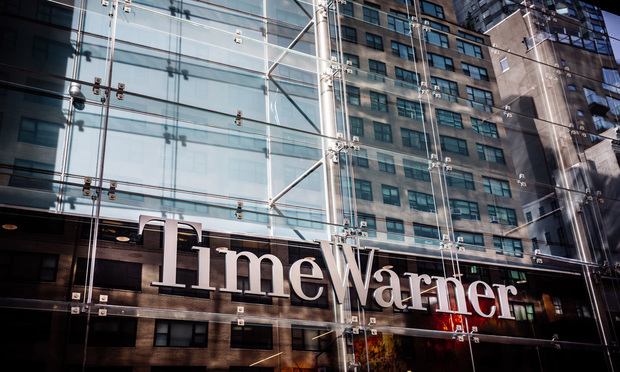Time Warner: Keep Prior Verdicts Out of Patent Damages
The cable giant blames Sprint's $140 million verdict on admission of an award from a previous case. But Sprint says prior verdicts are a natural part of any hypothetical negotiation.
October 05, 2018 at 06:18 PM
5 minute read

Time Warner Cable is trying to unwind a $140 million judgment for patent infringement with a novel argument. Backed by amici curiae Intel Corp. and Dell, the company argues that a prior jury verdict involving the same patents should not have been admitted to prove damages at its trial.
Sprint obtained the Time Warner verdict last year in a Kansas trial over VoIP technology. Its damages evidence included two comparable licenses and Sprint's 2007 verdict against Vonage over the same patents in which jurors awarded $1.37 per subscriber.
The Time Warner jury also awarded $1.37 per subscriber, generating the $140 million figure.
Kirkland & Ellis partner John O'Quinn argued Monday there was too much risk the jury would blindly follow the lead of its predecessors. The Vonage verdict was especially prejudicial, he argued, because it was based on the 25 percent “rule of thumb” for a reasonable royalty, a construct the Federal Circuit has since outlawed in Uniloc v. Microsoft.
“It's not like the verdict came in to be used to test someone's credibility or some entirely ancillary purpose,” O'Quinn told the court. “It was offered precisely for damages, the very issue on which the error occurred. Respectfully, this is a wolf in wolf's clothing.”
➤➤ Get IP news and commentary straight to your inbox with Scott Graham's email briefing, Skilled in the Art. Learn more and sign up here.
The issue clearly intrigued Federal Circuit Judges William Bryson and Raymond Chen, who peppered O'Quinn and opponent J. Michael Jakes, a partner at Finnegan, Henderson, Farabow, Garrett & Dunner, with questions throughout the 40-minute argument.
Damages in IP cases are based on hypothetical licensing negotiations between the parties before the damages period. Bryson pointed out that the hypothetical negotiation in Sprint v. Time Warner would have taken place in 2010, a year before Uniloc. “Why isn't it perfectly permissible” then to rely on the Vonage verdict, he asked, “just as a data point that the parties would have been aware of?”
O'Quinn began by arguing that the hypothetical negotiation is “a legal fiction.”
“Right,” Bryson replied, “but we live with it.”
Hypothetical negotiations also exclude unreliable information, such as comparable licenses that are overly influenced by settlement considerations. The Vonage verdict falls in that category, O'Quinn argued.
Bryson also pointed to Applied Medical Resources v. U.S. Surgical, a Federal Circuit decision that approved the admission of a prior verdict. O'Quinn argued that the verdict was admitted in that case to prove willfulness, but Bryson disagreed, explaining he'd reviewed not only the opinion but the briefs that were filed in the 2006 case. “Hypothetical negotiation was a separate argument from willfulness, as I read the record in that case,” he said.
It wasn't any easier for Sprint's lawyer, Jakes. Bryson began by telling him it “seems to me almost bizarre” that the Vonage verdict played “such a central role” in the Time Warner case. Sprint's comparable licenses put damages at 5 percent of Time Warner's VoIP revenue—which would have been close to the $1.37 per subscriber figure. “I'm not sure why we ended up in this very strange circular maneuver” with the prior verdict, the judge said.
Jakes said Sprint had simply been “trying to translate this amount into something that had previously been the basis of the parties' relationship, which was a per subscriber, per month cost.”
Chen said it was hard to believe that the $1.37 figure was “just a data point in the constellation of data points” on damages, when the jury's verdict “just happened to be to the hundredth decimal point the exact same verdict as the Vonage jury.”
Jakes argued that the $1.37 figure was actually less than Sprint would have obtained under its comparable licenses. Plus, Sprint and Time Warner had discussed the Vonage verdict in their actual licensing negotiations, Jakes said. “That's what normally happens,” he said. “They say 'Look, here's what we got in this prior case.'”
Bryson and Chen, however, didn't sound completely sold. “I have to say, I find the idea of relatively free use of prior verdicts troubling,” Bryson said, noting a patentee would never be allowed to convene eight expert witnesses and present their valuation without cross examination. “Why is that fundamentally different from introducing the verdict of eight lay people at the end of the trial?”
Chen said he shared the concern that courts shouldn't “admit jury verdicts left and right,” asking what the limiting principle would be.
“Is it comparable, and is it something that would be considered in a hypothetical negotiation,” Jakes replied. “And the answer to both of those is yes.”
This content has been archived. It is available through our partners, LexisNexis® and Bloomberg Law.
To view this content, please continue to their sites.
Not a Lexis Subscriber?
Subscribe Now
Not a Bloomberg Law Subscriber?
Subscribe Now
NOT FOR REPRINT
© 2025 ALM Global, LLC, All Rights Reserved. Request academic re-use from www.copyright.com. All other uses, submit a request to [email protected]. For more information visit Asset & Logo Licensing.
You Might Like
View All

TikTok Hit With California Class Action for Allegedly Mining Children's Data Without Parental Consent


Apple Disputes 'Efforts to Manufacture' Imaging Sensor Claims Against iPhone 15 Technology
Trending Stories
Who Got The Work
Michael G. Bongiorno, Andrew Scott Dulberg and Elizabeth E. Driscoll from Wilmer Cutler Pickering Hale and Dorr have stepped in to represent Symbotic Inc., an A.I.-enabled technology platform that focuses on increasing supply chain efficiency, and other defendants in a pending shareholder derivative lawsuit. The case, filed Oct. 2 in Massachusetts District Court by the Brown Law Firm on behalf of Stephen Austen, accuses certain officers and directors of misleading investors in regard to Symbotic's potential for margin growth by failing to disclose that the company was not equipped to timely deploy its systems or manage expenses through project delays. The case, assigned to U.S. District Judge Nathaniel M. Gorton, is 1:24-cv-12522, Austen v. Cohen et al.
Who Got The Work
Edmund Polubinski and Marie Killmond of Davis Polk & Wardwell have entered appearances for data platform software development company MongoDB and other defendants in a pending shareholder derivative lawsuit. The action, filed Oct. 7 in New York Southern District Court by the Brown Law Firm, accuses the company's directors and/or officers of falsely expressing confidence in the company’s restructuring of its sales incentive plan and downplaying the severity of decreases in its upfront commitments. The case is 1:24-cv-07594, Roy v. Ittycheria et al.
Who Got The Work
Amy O. Bruchs and Kurt F. Ellison of Michael Best & Friedrich have entered appearances for Epic Systems Corp. in a pending employment discrimination lawsuit. The suit was filed Sept. 7 in Wisconsin Western District Court by Levine Eisberner LLC and Siri & Glimstad on behalf of a project manager who claims that he was wrongfully terminated after applying for a religious exemption to the defendant's COVID-19 vaccine mandate. The case, assigned to U.S. Magistrate Judge Anita Marie Boor, is 3:24-cv-00630, Secker, Nathan v. Epic Systems Corporation.
Who Got The Work
David X. Sullivan, Thomas J. Finn and Gregory A. Hall from McCarter & English have entered appearances for Sunrun Installation Services in a pending civil rights lawsuit. The complaint was filed Sept. 4 in Connecticut District Court by attorney Robert M. Berke on behalf of former employee George Edward Steins, who was arrested and charged with employing an unregistered home improvement salesperson. The complaint alleges that had Sunrun informed the Connecticut Department of Consumer Protection that the plaintiff's employment had ended in 2017 and that he no longer held Sunrun's home improvement contractor license, he would not have been hit with charges, which were dismissed in May 2024. The case, assigned to U.S. District Judge Jeffrey A. Meyer, is 3:24-cv-01423, Steins v. Sunrun, Inc. et al.
Who Got The Work
Greenberg Traurig shareholder Joshua L. Raskin has entered an appearance for boohoo.com UK Ltd. in a pending patent infringement lawsuit. The suit, filed Sept. 3 in Texas Eastern District Court by Rozier Hardt McDonough on behalf of Alto Dynamics, asserts five patents related to an online shopping platform. The case, assigned to U.S. District Judge Rodney Gilstrap, is 2:24-cv-00719, Alto Dynamics, LLC v. boohoo.com UK Limited.
Featured Firms
Law Offices of Gary Martin Hays & Associates, P.C.
(470) 294-1674
Law Offices of Mark E. Salomone
(857) 444-6468
Smith & Hassler
(713) 739-1250








